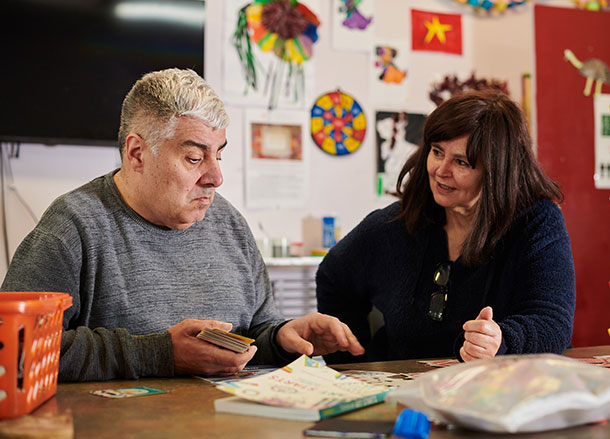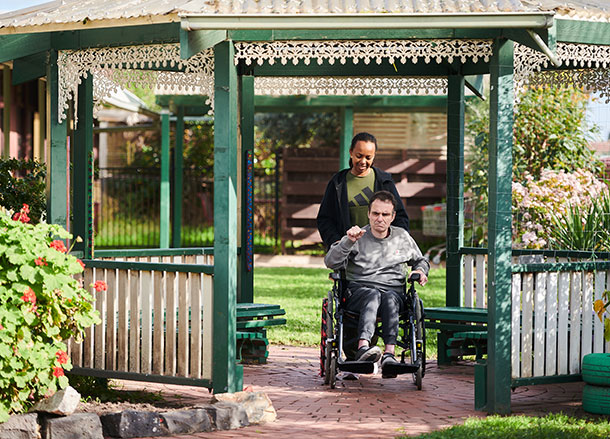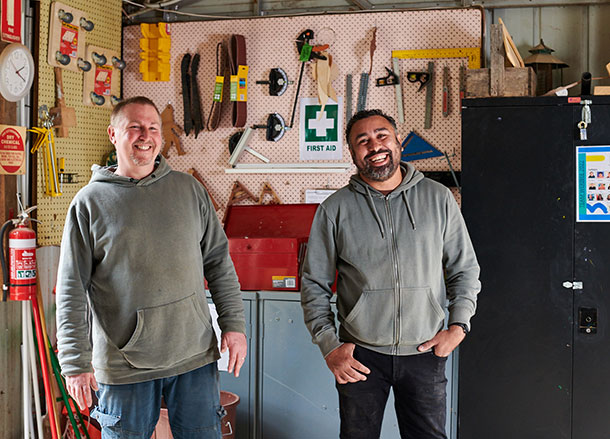Beyond technical skills and specific knowledge, soft skills are what make an exceptional support worker. These essential interpersonal and personal qualities help you build trust, handle complex situations, and, ultimately, positively impact those you support. So, what are these essential support worker skills, and how can you develop them?
10 Soft skills for disability support workers
Soft skills are crucial skills of a disability support worker, including communication, empathy, time management and adaptability. These skills help build trust and respond to each person’s changing needs. Critical thinking, patience and stress management also support calm, confident care. Together, they help you provide support that’s safe, respectful and person-centred.

1. Excellent communication skills
Being able to communicate effectively builds trust and ensures everyone is on the same page. It encompasses:
- Active listening. Actively listening means you go beyond simply hearing someone speak. Being a good communicator means you listen carefully, clarify questions when needed, and avoid interruption.
- Understanding non-verbal cues. People communicate not just with words but also with their body language, facial expressions, and tone of voice. As a support worker, you must be adept at reading these non-verbal cues to understand what’s being said, even in silence, especially when someone might be hesitant or unable to express themselves verbally.
- Adapting communication style to the specific needs of each individual. You also need to be able to communicate complex information in a clear, concise, and easy-to-understand way. Avoid jargon and technical terms, use short sentences, and adapt your language to the individual’s level of understanding.
2. Time management
A support worker’s schedule isn’t always a neat checklist. It’s a constant negotiation between immediate needs and ongoing responsibilities. For example, you might deal with an unexpected incident demanding immediate attention while ensuring routine tasks–medication and check-ins–are on schedule.
The key is finding the balance. Recognise when the person you’re supporting is uncomfortable or dysregulated and needs a different activity or environment, even if it means pushing back a planned activity. It’s about being both responsive and resourceful, knowing when to adapt and when to hold firm.
But balancing doesn’t mean compromising quality. You still need to ensure thoroughness and care.
3. Critical thinking
Support work is inherently unpredictable. While routines offer structure, unexpected challenges can arise at any time. A sudden illness, a communication barrier, or a family crisis can disrupt the best-laid plans, requiring clear and decisive thinking.
This is why critical thinking is one of the most important skills for support worker roles. It equips you to make sound decisions when confronted with complexity. This soft skill involves analysing the situation objectively, exploring various solution options, and remaining flexible in the face of change.
4. Great organisation and attention to detail
For a support worker, accurate and up-to-date information is like a clear map that guides them through the day, ensuring medication schedules are met, appointments are kept, and all needs are addressed.
Organisational skills help efficiently manage tasks and client records, while attention to detail is needed to accurately track the person’s conditions and medications. Together, they minimise errors, enhance safety and ensure individual needs are met.
5. Stress management
The constant demands of support work can take its toll on your mental health. This is why stress management is a vital soft skill all support workers should have.
What makes a good support worker? Managing stress with self-awareness is one key trait. As a support worker, you should recognise stress signals like fatigue, irritability, or difficulty focusing. Then, know when and how to unload the emotional burden–maybe by talking to colleagues, friends, or a therapist. They can provide a safe space to vent, share experiences, and give valuable advice to manage your tasks and care for your mental health.
6. Adaptability to evolving situations
Support work is a dynamic field, so you must be able to quickly adjust care plans to meet the changing needs of individuals with a disability. This involves modifying communication methods, daily routines, and care strategies to suit evolving conditions.
To be able to adapt, you must stay informed about new techniques and requirements and be open to change.
7. Empathy and patience
Other necessary soft skills are empathy and patience. Empathy means you know how to acknowledge the feelings of the person you’re supporting and provide support sensitive to their emotional needs, especially in difficult situations.
Patience entails maintaining a calm and understanding approach, especially in situations where progress may be gradual.
8. Creativity and dynamic approach to providing supports
Creativity in disability support is about developing unique and innovative methods to engage and assist individuals with disabilities. This involves thinking outside the box to design activities, therapies, and support strategies to transform routine care into an enriching and stimulating experience for better engagement and accelerating progress.
A dynamic approach complements creativity by being flexible and responsive to the changing needs of individuals. This might include introducing new activities that align with evolving interests or modifying support techniques as individuals’ abilities change.
9. Resourcefulness
Sometimes, the necessary tools or resources are unavailable, particularly when caring for individuals with different support needs. In these instances, you have to be resourceful. You need to make do with what you have–adapting existing tools and leveraging technology or community networks. This approach ensures effective, adaptive, and tailored support despite lacking ideal resources.
10. Openness to criticism
Criticism, though often perceived as unfavourable, is a crucial learning tool in support work. To be a good support worker, you have to be open to it because it helps you to refine and improve support practices.
This requires an attitude of learning and adaptability, where feedback from colleagues, supervisors, or the individuals being supported is seen as a beneficial guide towards better performance instead of an attack on your ability.
How to develop your support worker’s soft skills?
You can grow your soft skills as a support worker by taking part in training, learning from others, and staying up to date with best practices. Join networks to share ideas and feel supported. Volunteering gives you real-life experience with empathy, communication, and flexibility, helping you build confidence and offer stronger, more responsive support.

Proactively educate and train yourself
You can keep learning by enrolling in relevant courses or workshops or by seeking mentorship. Look for programs that address specific soft skills like communication, conflict resolution, or active listening. You can also seek guidance from experienced support workers. Observing their interactions and learning from their insights can be invaluable.
Stay up to date
New technologies, research findings, and best practices emerge regularly in disability support, so you must stay informed. Actively seek out learning opportunities like conferences, webinars, or online courses. You can also subscribe to newsletters or journals and follow thought leaders. The more you nurture your knowledge, the better equipped you are to support your clients.
Join professional networks
Joining professional networks and communities is another effective way to enhance your soft skills as a support worker. By being a part of such networks, you can gain insights from experienced professionals, participate in discussions about best practices, and learn from the collective experiences of others in the field. They can also help you overcome challenges in ways you haven’t thought about before.
Also, these networks can offer emotional support and a sense of belonging, which is valuable in a field that can be emotionally demanding.
Seek volunteering opportunities
When you volunteer, you’re not just making a meaningful difference in the lives of others, you’re also applying your skills in real-life scenarios. This hands-on experience allows you to practise and refine the soft skills you’ve learned, such as empathy, communication, and adaptability, in actual disability support settings.
Volunteering also exposes you to various situations and challenges you might not encounter anywhere else, offering a unique perspective and deeper understanding of the needs of people with a disability.
Lastly, these experiences can boost your confidence and competence in your professional role.
Be a support worker at Mambourin

Looking to apply your skills of support worker roles in a meaningful career? At Mambourin, you can build your skills, connect with like-minded individuals, and make a lasting impact. Explore our career paths and volunteer options today.
